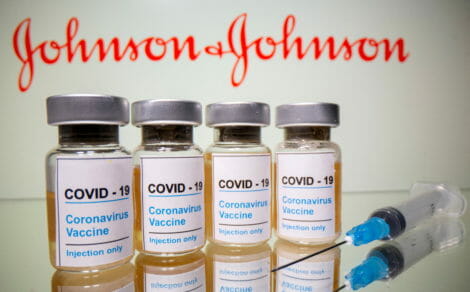J&J booster 85% effective against Omicron hospitalisation, says South Africa

FILE PHOTO: Vials with a sticker reading, “COVID-19 / Coronavirus vaccine / Injection only” and a medical syringe are seen in front of a displayed Johnson & Johnson logo in this illustration taken October 31, 2020. REUTERS/Dado Ruvic
JOHANNESBURG — A Johnson and Johnson COVID-19 vaccine booster shot is 85% effective in protecting against being hospitalized by the Omicron variant for 1-2 months after it is received, the head of South Africa’s Medical Research Council (SAMRC) said on Friday.
Glenda Gray presented the findings of a SAMRC study at a South African health ministry briefing on the COVID-19 fourth wave, which has been driven by the new variant.
ADVERTISEMENT
“We saw an 85% vaccine effectiveness and we saw that this kind of vaccine effectiveness is maintained for up to two months,” she said. “We are very happy to report very high levels of vaccine effectiveness against Omicron.”
The study involved 477,234 healthcare workers, all of them vaccinated with the J&J shot, of whom 236,000 — roughly half — had received the J&J booster shot.
It looked at hospitalizations among those healthcare workers who had been infected during the fourth wave, and found that the booster shot reduced hospitalizations by 63% in the first two weeks after the booster, going up to 85% after that for between one and two months.
“This is the world’s first evidence of vaccine effectiveness (against Omicron) using the J&J vaccine,” Gray said.
The South African authorities have thus far maintained a preference for the Pfizer vaccine — they have administered 21 million doses, three times as many as the roughly 7 million J&J vaccine doses.
But the J&J shot is considered logistically much more preferable because it is a single-dose regimen, which is easier to administer in remote rural areas, where follow-ups can be difficult.
The data supported already strong global evidence that Omicron can evade vaccine protection when it comes to the initial infection.
Among the participants in the study, there were about 30,000 breakthrough infections during the Omicron wave, compared with only around 11,000 each in the previous waves driven by the Delta and Beta variants.
The study also highlighted that those infected with HIV were more vulnerable to being hospitalized with Omicron.
ADVERTISEMENT
“They (those being hospitalized) are more likely to have HIV and less likely to have other comorbidities as compared to the Beta and Delta period,” Gray said.
HIV prevalence in South Africa is about 13%.
The latest tech news delivered to your inbox
For more news about the novel coronavirus click here.
What you need to know about Coronavirus.
For more information on COVID-19, call the DOH Hotline: (02) 86517800 local 1149/1150.
The Inquirer Foundation supports our healthcare frontliners and is still accepting cash donations to be deposited at Banco de Oro (BDO) current account #007960018860 or donate through PayMaya using this link .
Read Next
Top Xbox One Games Coming Out This Year
EDITORS’ PICK
MOST READ
Don’t miss out on the latest news and information. 
View comments

